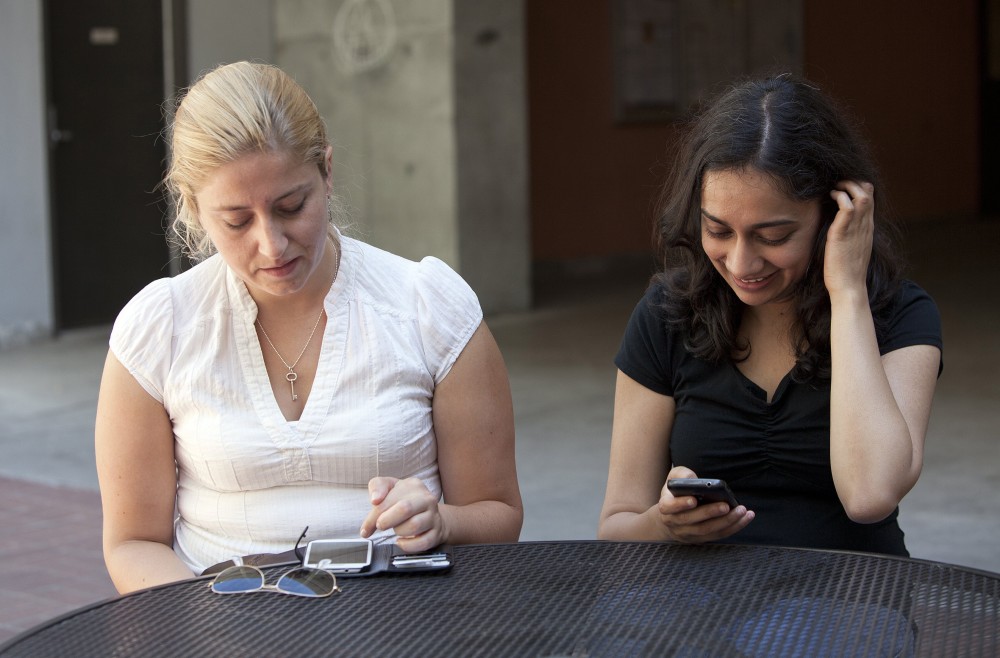By Tamara Dietrich
Daily Press (Newport News, Va.).
Back when she was a college student, physicist Gail Dodge didn’t feel her gender was an issue in the classroom.
“I was very much in a minority, but I don’t remember minding that too much at that time,” Dodge, 51, recalled Wednesday.
Today, Dodge is a full professor at Old Dominion University in Norfolk. And, last year, she attended an annual Conference for Undergraduate Women in Physics at Duke University in North Carolina.
She was surprised at the impact it had on her.
“I was absolutely blown away by being in a room with so many women physicists,” Dodge said. “I think it’s hard even to know how that can feel — to always be one of only a few and go to a conference and everyone there is a woman in physics.”
Now Dodge is the main organizer for this year’s conference for the Mid-Atlantic region, hosted jointly by ODU and Jefferson Laboratory in Newport News. It’s one of nine such conferences scheduled this weekend around the country by the American Physical Society to encourage young women to pursue physics as a career.
“The main goal is to show that they’re not alone, and have a chance to network and to build a sense of community,” Dodge said.
“Because we think that one of the reasons why some women don’t pursue a career in physics is there’s just not that many yet in the field.”
It’s been a common refrain for years, how few women in this country — and in Great Britain and Scandinavian countries — pursue the hard sciences compared to men.
The APS has been trying to boost those numbers since 1972, when U.S. women earned only 7 percent of the bachelor’s degrees and 3 percent of the doctorates in physics.
By 2013, those numbers had reached only 20 percent for both degrees.
Meanwhile, in countries such as Italy, France and some Latin American nations, women are much better represented in the field.
Reasons for the disparity aren’t clear, but surveys suggest issues ranging from lack of reliable parental leave and affordable child care to cultural conditioning.
Dodge suggests the need for more female role models, and toppling stereotypes.
“I think they have a lot of stereotypes in their head about what it means to be a physicist — like an Albert Einstein kind of thing,” Dodge said. “Women are successful in physics and they have families and they have a life.”
Role models were key for Latifa Elouadrhiri, a senior scientist at Jefferson Lab and a conference organizer.
Born in Morocco as one of eight children to a woman who had no formal education, Elouadrhiri still was encouraged early on to pursue her passions.
“I was fortunate to have the most wonderful role model in my life, which was my mother,” Elouadrhiri said. “She didn’t know how to write or read, but her teaching was so profound on us. For her, follow your dream, follow your passion. Research requires that. It’s not something you can do without love. You have to have passion and love for it.”
In high school in Morocco, a teacher recognized Elouadrhiri’s skill at math and suggested physics. Later, she found more mentors while pursuing her bachelor’s and master’s degrees at Mohammed V University in Rabat and her Ph.D. in France.
But she also faced challenges because of her gender.
“Every country has the issues of women in science at different stages,” Elouadrhiri said. “In Morocco, for instance, studying science in high school, it’s no big deal. If you are good, you are encouraged and it’s wonderful. It’s later on when problems come, when women suffer, taking on higher-level positions (or) leading a research group or being a high-level professor.
“It’s also culture around women — a woman is supposed to get married and get children. The perception is that you cannot do both.”
The conference will run Friday through Sunday and include a rare tour of the particle beam accelerator facilities at Jefferson Lab, which just underwent a $338 million upgrade to double its energy capacity and position the facility as a world leader in studying the building blocks of matter.
Students also will meet prominent women scientists and more than 30 industry, government and university representatives to learn about a wide range of career options.
About 150 students from throughout the Mid-Atlantic are expected to attend.
“I hope undergraduates coming here will have a similar experience” to her own at the Duke conference, Dodge said. “And it will be a very powerful influence on their decision whether to pursue physics.”
It can be a turning point, Elouadrhiri said, “when someone looks at you in the eyes and thinks without doubt that you are capable. And can see even more potential in you than you see in yourself. This is what you have to have.
“It is harder for women for sure, but it should not stop us.”














































































































































































































































































































































































